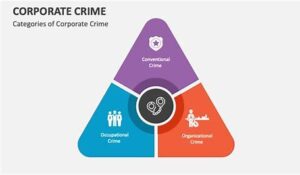Title: Corporate Crimes in the USA: Understanding Types, Impacts, and Regulatory Responses
Abstract:
Corporate crimes in the USA represent a significant challenge to the integrity of markets, public trust, and societal well-being. This essay provides a comprehensive analysis of corporate crimes in the USA, examining various types of offenses, their impacts on stakeholders, and regulatory responses to mitigate risks and promote accountability. Through case studies and empirical evidence, this essay explores the dynamics of corporate misconduct, including fraud, corruption, environmental violations, and product safety failures. By examining regulatory frameworks, enforcement mechanisms, and corporate governance practices, it offers insights into addressing systemic issues and fostering corporate responsibility in the USA.
Keywords: Corporate Crimes, White-Collar Crimes, Fraud, Corruption, Regulatory Responses, Corporate Governance, USA

-
Introduction
Corporate crimes, defined as illegal activities committed by corporations
or their executives for financial gain, pose significant threats to the integrity
of markets, consumer welfare, and public trust.
In the United States, corporate misconduct spans a wide range of offenses, including fraud, corruption, environmental violations, antitrust violations, and product safety failures. This essay provides a comprehensive examination of corporate crimes in the USA, exploring their types, impacts, regulatory responses, and implications for corporate governance and accountability. By analyzing case studies, regulatory frameworks, and enforcement mechanisms, it aims to deepen understanding of the complex dynamics of corporate misconduct and avenues for addressing systemic issues.
-
Types of Corporate Crimes
Financial Fraud:
Corporate fraud encompasses various deceptive practices aimed at misrepresenting financial information to investors, regulators, or other stakeholders. Examples include accounting fraud, securities fraud, insider trading, and Ponzi schemes, which can result in substantial financial losses and undermine market confidence.
Corruption:
Corporate corruption involves bribery, kickbacks, and other illicit payments made to government officials or business partners to secure favorable treatment, contracts, or regulatory approvals. Bribery of public officials, foreign corrupt practices, and embezzlement are common forms of corporate corruption that erode trust and distort market competition.
Environmental Violations:
Corporations may engage in environmental crimes such as pollution, illegal dumping, and failure to comply with environmental regulations. These offenses pose risks to public health, natural resources, and ecosystems, leading to environmental degradation and community harm.

Product Safety Failures:
Failure to ensure the safety and quality of products can result in corporate liability for injuries, illnesses, or fatalities caused by defective or hazardous products. Product recalls, product liability lawsuits, and regulatory fines are consequences of corporate negligence in ensuring product safety standards.
-
Impacts of Corporate Crimes
Economic Costs:
Corporate crimes impose significant economic costs on society, including financial losses to investors, consumers, and taxpayers, as well as damage to market integrity and investor confidence. Fraudulent activities such as accounting fraud and securities manipulation can lead to market distortions and systemic risks.
Social Harm:
Corporate misconduct can have profound social consequences, including harm to communities, environmental degradation, and erosion of public trust in institutions. Environmental violations and product safety failures may result in adverse health effects, environmental contamination, and loss of livelihoods for affected populations.
Regulatory Erosion:
Persistent corporate crimes undermine the effectiveness of regulatory regimes and erode public confidence in government oversight and enforcement. Regulatory capture, revolving door practices, and inadequate penalties for corporate offenders contribute to a culture of impunity and regulatory failure.
Legal and Reputational Risks:
Corporations implicated in criminal activities face legal liabilities, regulatory sanctions, and reputational damage that can tarnish their brand image and stakeholder relations. Litigation costs, fines, and penalties associated with corporate crimes can have long-lasting financial and reputational repercussions.
-
Regulatory Responses to Corporate Crimes
Legislative Reforms:
Governments enact legislation to strengthen regulatory frameworks, enhance corporate accountability, and deter corporate misconduct. Laws such as the Sarbanes-Oxley Act, Dodd-Frank Act, and Foreign Corrupt Practices Act (FCPA) impose stringent disclosure requirements, internal controls, and anti-corruption measures on corporations.

Enforcement Actions:
Regulatory agencies, such as the Securities and Exchange Commission (SEC), Department of Justice (DOJ), and Environmental Protection Agency (EPA), investigate and prosecute corporate crimes through civil enforcement actions, criminal prosecutions, and regulatory sanctions. High-profile cases against corporate offenders serve as deterrents and signal government commitment to upholding the rule of law.
Corporate Governance Reforms:
Enhanced corporate governance practices, including board oversight, risk management, and transparency measures, are essential for preventing corporate crimes and promoting ethical conduct. Independent board oversight, whistleblower protection, and ethical codes of conduct help mitigate risks of corporate misconduct and enhance accountability.
International Cooperation:
Given the global nature of corporate crimes, international cooperation and collaboration among law enforcement agencies, regulatory bodies, and multilateral organizations are essential for combating cross-border offenses and addressing jurisdictional challenges. Initiatives such as the OECD Anti-Bribery Convention and INTERPOL’s Global Financial Crime Taskforce facilitate information sharing and coordination among countries to combat corporate corruption and fraud.
-
Challenges and Criticisms
Regulatory Capture:
Regulatory agencies may be susceptible to capture by powerful corporate interests, leading to lax enforcement, regulatory capture, and lenient penalties for corporate offenders. Revolving door practices, industry influence, and political pressure can undermine regulatory independence and effectiveness in addressing corporate crimes.
Inadequate Penalties:
Critics argue that penalties imposed on corporations for criminal offenses are often insufficient to deter misconduct or compensate victims adequately. Fines, settlements, and corporate plea agreements may be perceived as a cost of doing business rather than meaningful deterrents, leading to impunity and recidivism among corporate offenders.

Regulatory Arbitrage:
Corporations may exploit regulatory loopholes, jurisdictional differences, and regulatory arbitrage strategies to evade accountability and circumvent legal liabilities. Offshore tax havens, shell companies, and complex corporate structures are used to conceal illicit activities and evade detection by authorities.
Compliance Challenges:
Compliance with regulatory requirements and ethical standards poses challenges for corporations, particularly multinational firms operating in diverse regulatory environments. Cultural differences, competing priorities, and resource constraints may impede effective compliance programs and risk management practices, leaving corporations vulnerable to legal and reputational risks.
-
Future Directions and Opportunities
Strengthening Regulatory Oversight:
Enhancing regulatory oversight, enforcement capabilities, and transparency measures is critical for addressing corporate crimes and restoring public trust in regulatory institutions. Strengthening whistleblower protections, enhancing regulatory scrutiny of corporate practices, and promoting accountability for corporate executives are essential steps towards preventing corporate misconduct and promoting market integrity.
Promoting Corporate Accountability:
Promoting corporate accountability requires collaboration among governments, civil society organizations, and businesses to promote responsible corporate conduct and ethical business practices. Initiatives such as corporate social responsibility (CSR), sustainability reporting, and stakeholder engagement can foster a culture of accountability and transparency in corporate governance.
Empowering Stakeholders:
Empowering stakeholders, including investors, consumers, employees, and communities, to hold corporations accountable for their actions is essential for promoting corporate responsibility and ethical behavior. Shareholder activism, consumer advocacy, and community organizing play a crucial role in driving corporate accountability and promoting social change.

-
Conclusion
Corporate crimes in the USA represent a significant challenge to the integrity of markets, public trust, and societal well-being. Addressing corporate misconduct requires a multifaceted approach that includes legislative reforms, enforcement actions, corporate governance reforms, and international cooperation. By enhancing regulatory oversight, promoting corporate accountability, and empowering stakeholders, policymakers, regulators, and businesses can mitigate risks of corporate crimes and foster a culture of integrity, transparency, and responsibility in corporate governance.



